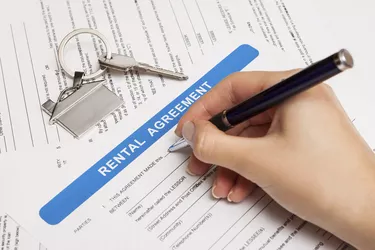
Renters face a variety of expenses. You will have to pay a deposit and first month's rent before you move in. You'll also need to buy renter's insurance to protect your belongings because the landlord will carry coverage on the structure only. You may have to pay monthly utilities or the landlord may include water and trash as part of the rent. One expense that the owner may not clarify upfront is whether or not you are responsible for the property taxes on your rental.
Purpose
Video of the Day
Property tax is an annual amount that owners pay for their real estate. Every jurisdiction has a different way of calculating how much to charge each homeowner or landlord. Many areas base it on the sale price in addition to other charges and taxes on the property, such as those for schools or road maintenance. Some localities reassess property each year to calculate the annual tax amount.
Video of the Day
Landlord Responsibility
When you rent a home, it is generally the landlord's responsibility to pay the property tax bill. However, a real estate investor will ensure that the market rent is sufficient to cover all expenses, such as the mortgage payment, insurance, homeowner's association fees, repairs, vacancies and property taxes. If the amount of rent a tenant is willing to pay for that area is not enough to support the owner's expenses, then it may be a financial hardship to pay the property tax bill.
Tenant Responsibility
Tenants who sign a lease normally pay one amount each month for rent and neighborhood amenities, if any. Occupants will pay a rent amount that the market will bear, so, if the landlord has rent set at a level higher than similar properties in order to cover the property tax payment, it will be hard to find interested and qualified tenants. If you engage in a lease option, or rent-to-own, agreement the seller continues to pay the property taxes until the time that the transaction and title change is completed. Renting, as opposed to actually owning property, doesn't help you avoid paying property taxes. The property owner's taxes are built into the amount you pay to rent your home or commercial property.
Commercial Property
If you rent commercial property, such as an office building or retail strip space, your lease agreement may require a triple net contract. Under this arrangement, the tenant pays an additional fee over and above the rent for its share of property taxes, hazard insurance and common-area maintenance. This may not seem fair to the tenant, but sharing the cost of these expenses with other occupants may result in the total amount of payments being lower than properties that do not require a triple net lease.
Double Check the Property Taxes Due
For tenants who suspect that the landlord isn't fulfilling the responsibility for paying property taxes, check with the local government assessor's office -- usually county or township government -- to confirm that the landlord is paying taxes. When a property is delinquent on taxes, there is a possibility the county or township can sell the property for excessive delinquencies. If you are concerned that your landlord isn't paying taxes, you can always address this issue with the landlord to ensure you don't become a displaced tenant.